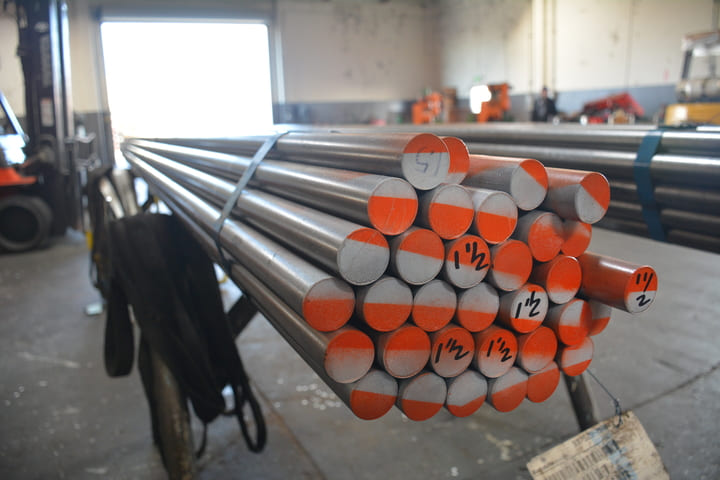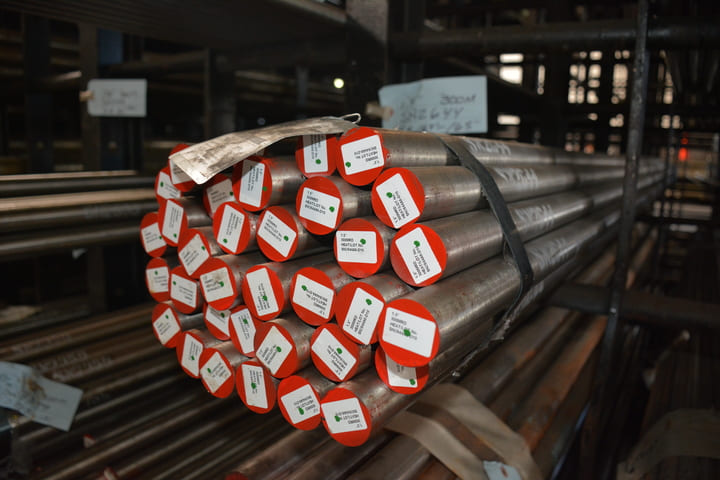M50 Alloy Steel
M50 enjoys widespread popularity due to its toughness, wear resistance and heat resistant properties. It is often used in aircraft and aerospace components, as well as bearings and cutting tools. Moreover, its high-temperature strength makes it particularly useful in certain applications.
M50 alloy can be improved through various heat treatment methods such as quenching and tempering, annealing, and carburizing. Quenching and tempering may raise the hardness and strength of this alloy while annealing could make it easier to machine and also reduce inner tensions.
Friend Metals Distributor is your trusted source for high-quality M50 alloy products. From bars to forgings and custom shapes, our selection of available materials can meet any customer requirement.
Call Us at 714-632-0140 or Toll-Free at 800-854-6777.

M50 Forging
Forging with material M50 alloy is an ideal choice due to its impressive characteristics, such as strength, toughness, and wear resistance. When it undergoes the forging process, these qualities are further enhanced, resulting in a product that offers extraordinary performance in difficult environments and under significant loads.
Forging is a method of forming metal that involves utilizing concentrated pressure with a hammer or press to modify its shape. This action helps to organize and compact grain structure, which results in improved strength and performance. M50 alloy is suitable for various types of forging, such as hot, cold and open die techniques.
M50 alloy is often formed through the process of forging, which is by far the most popular method. This involves raising the temperature to between 1900-2200°F in order to make it malleable and more workable. Then a hammering press or hammer is used to shape it into its intended form with extreme force applied. By going through this process, the grains of the material become smaller, leading to enhanced sturdiness and durability.
Forging M50 alloy at room temperature or slightly above is a great way to produce a product with improved surface finish and dimensional accuracy. This process, known as “cool forging”, involves using pressure to shape the material into complex shapes with tight tolerances. As opposed to other methods of forming the metal, it ensures superior quality of the final product.
Open die forging is a process where the material is shaped between two flat dies without confinement. This process is often used for larger parts, and can result in a more uniform grain structure and improved strength.
It is essential to properly heat and cool the material, no matter which forging process is utilized, in order to avoid fissures or any other issues. In addition, it is critical that the right kind of heat treatment process should be picked for acquiring the desirable mechanical qualities of the end product.
When it comes to forging M50 alloy and other top-tier metals, Friend Metals Co is the key. Our team of specialists can provide guidance on the best possible forging process and heat treatment for your specific goals.

M50 Bar
M50 bar made from high-grade, heat-treated steel is a preferred option for components that require excellent performance in challenging environments. It has notably high strength and toughness, making it suitable for applications that demand much from the material such as those found in aerospace and defense industries. Moreover, its exceptional wear resistance gives it another added advantage.
M50 alloy steel, a combination of chromium, molybdenum, and vanadium, is known for its special characteristics. Upon manufacture into bar form this metal alloy can be used to construct gears, shafts and bearings.
M50 bar can be manufactured with either hot rolling or cold drawing. Hot rolling requires the material to be heated to a higher temperature before passing it through rollers for reshaping, whereas cold drawing involves pulling the material through a die in ordinary temperature to get the size and shape desired.
When it comes to alloy steel M50 bar, heat treatment is a must in order to achieve the desired mechanical properties. This usually involves subjecting the material to high temperatures and subsequently quenching it in either water or oil. By doing this, not only does the hardness and strength of the material increase, but also its wear resistance is amplified.
Friend Metals Co has an expansive selection of alloy steel M50 bar options. Our stock features varying sizes and shapes, and we can make custom cuts to satisfy any requirement.
M50 Alloy Chemical Composition
The chemical composition of M50 alloy typically includes:
- Carbon (C): 0.80 – 0.95%
- Manganese (Mn): 0.20 – 0.50%
- Silicon (Si): 0.20 – 0.50%
- Chromium (Cr): 3.50 – 4.25%
- Molybdenum (Mo): 0.35 – 0.55%
- Vanadium (V): 1.75 – 2.25%
- Nickel (Ni): 1.75 – 2.25%
- Copper (Cu): 0.25 – 0.50%
The composition of M50 Alloy gives it excellent properties that set it apart from other metals. Its distinctive strength, toughness and resistance to wear is thanks to its chromium, vanadium, nickel and copper elements. Additionally, the carbon and manganese give it hardenability and strength which complete its impressive suite of qualities.
M50 Alloy Mechanical Properties
The mechanical properties of M50 Alloy can vary depending on the specific heat treatment and manufacturing process used, as well as the size and shape of the material. However, some typical mechanical properties for this material include:
- Tensile strength: 240 ksi (1655 MPa)
- Yield strength: 200 ksi (1380 MPa)
- Elongation: 10%
- Reduction of area: 40%
- Hardness (Rockwell C): 57 – 62
M50 Alloy is renowned for its remarkable properties, making it ideal for use in applications that need top-notch strength, toughness, and wear resistance. This particular steel is frequently found in the aerospace and defense industries due to its excellent performance in environments where conditions are extreme. A myriad of components such as bearings, gears, and shafts benefit from this metal’s dependability when put into real-world situations.
For optimal performance, proper heat treatment of M50 Alloy is essential. The process involves heating the material until it reaches a certain temperature, followed by quenching in either an oil or water bath. This procedure helps attain the necessary mechanical properties such as toughness and strength that are required for a specific purpose. Variations may be made depending on the goals of each application.
